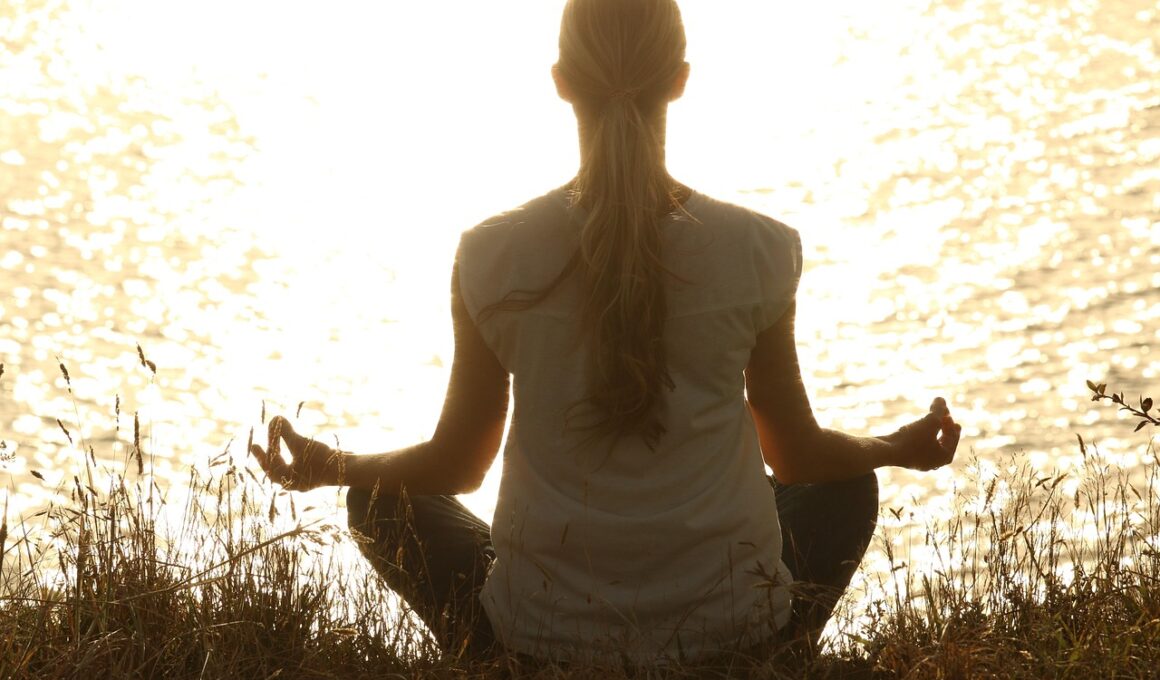The Benefits of Yoga and Meditation for Stress and Sleep Improvement
The relationship between stress and sleep is profound, affecting overall health. Stress activates the body’s fight-or-flight response, making it harder to relax and fall asleep. A vicious cycle ensues where poor sleep increases stress, impacting productivity and well-being. Understanding how stress influences sleep helps in finding effective solutions. Yoga and meditation emerge as two practices that can substantially mitigate the impacts of stress. They provide physical and mental benefits that help manage stress levels effectively. These techniques promote relaxation, allowing individuals to wind down and prepare for sleep. Simply practicing yoga can lead to improved sleep quality and less time taken to fall asleep. Similarly, meditation allows one to focus and calm the mind, reducing racing thoughts that often accompany anxiety. By lowering cortisol levels and improving emotional regulation, both yoga and meditation refine a person’s ability to handle stress. Including these practices as part of a daily routine can significantly improve not just sleep quality but also overall life satisfaction. Consider how integrating yoga and meditation could enhance your life and reduce stress, leading to better sleep outcomes.
Understanding Stress and Its Effects
Recognizing stress triggers and understanding their consequences is crucial for enhancing sleep. Stress comes from various sources: work, personal relationships, and financial issues. Each individual responds differently, but common signs of stress include irritability, anxiety, and fatigue. Such symptoms can lead to sleepless nights or restless sleep. High stress levels elevate heart rate and adrenaline, which are not conducive to the relaxation required for adequate sleep. Chronic stress can result in significant health issues, including insomnia and mental health disorders. To combat this, implementing holistic approaches is essential. Yoga serves as an effective stress-management tool. Regular practice can ease muscle tension and enhance flexibility while promoting mental calmness. Meditation also teaches the mind to focus, developing mindfulness that shifts attention away from stressful thoughts. Practicing mindfulness and being present can significantly reduce anxiety levels. For those who struggle with sleep, this means recognizing the impact of stress on sleep disturbances. By becoming aware of stressors and managing them through yoga and meditation, individuals can create a peaceful environment for sleep, enhancing both the quality and length of sleep.
Yoga is not just a form of exercise but a comprehensive approach to relaxation and recovery. Utilizing breathing techniques in yoga can activate the body’s parasympathetic nervous system, instilling feelings of calmness. This calm state is ideal for winding down before bed and preparing for sleep. Various yoga postures also help to relieve physical stiffness and discomfort, which are common barriers to achieving restful sleep. Techniques such as gentle stretching can release pent-up tension stored in the body. The poses, combined with slow movement and breathwork, help lower blood pressure and promote a sense of tranquility. Additionally, restorative yoga is particularly beneficial for stress relief. This practice involves gentle stretches and longer holds, which acts to soothe the mind and body. Learning to listen to your body through yoga can foster a deeper understanding of when to rest and how to rejuvenate. Incorporating this practice into a nightly routine sets the stage for improved sleep quality, as it signals the body to unwind. Thus, yoga emerges as an excellent tool for stress reduction and a natural pathway to enhanced sleep experiences.
The Role of Meditation
Meditation complements yoga effectively as a tool for stress and sleep enhancement. Engaging in daily meditation practice can provide mental clarity, allowing individuals to process emotions better. This practice helps declutter the mind, transforming chaotic thoughts into a more peaceful mental landscape. Consequently, it aids in reducing anxiety and stress levels significantly. With meditation, individuals learn techniques to focus attention and live in the present moment rather than worrying about past or future concerns. This ability to be present fosters a calming atmosphere that is perfect for sleep. In addition, specific meditation techniques are designed to promote relaxation. Mindfulness meditation, for instance, is effective in teaching individuals how to observe their thoughts without judgment. This approach enables a healthier relationship with stress and anxiety, facilitating better emotional responses. The practice of loving-kindness meditation specifically cultivates feelings of compassion and acceptance, which eases emotional distress. Integrating meditation with yoga creates a holistic approach to well-being that not only fights stress but also lays the foundation for restorative sleep. By nurturing the mind, heart, and body, individuals can truly experience tranquility.
Establishing a routine that incorporates both yoga and meditation elevates overall health benefits. Consistency is key to experiencing positive changes in sleep and stress levels. By setting aside regular times each day for these practices, individuals can create a habit that promotes relaxation and wellness. Morning yoga can kickstart the day with serenity while evening meditation provides a calming closure. A simple yoga flow can energize the body and awaken the mind, while evening meditation helps to signal the body that it’s time to wind down. Creating a peaceful space for these practices can enhance their effectiveness. Whether it’s a cozy corner of a bedroom with soft lighting or a quiet spot in a garden, setting the mood is essential. Breathing exercises should also be incorporated both during yoga and meditation, emphasizing deep and controlled breaths. This connection between breath and movement promotes a sense of unity and peace. When practiced persistently, the combination of yoga and meditation cultivates resilience. It ultimately reduces the impact of stress, paving the way for improved sleep and restorative nights.
Holistic Approach to Stress Management
To effectively manage stress and enhance sleep, a holistic approach is essential. Yoga and meditation should be coupled with other stress-reducing practices such as healthy nutrition and sufficient hydration. A balanced diet rich in fruits, vegetables, whole grains, and proteins supports mental well-being. Important nutrients like magnesium and omega-3 fatty acids can help regulate mood and anxiety levels. Additionally, staying hydrated is vital as dehydration can lead to fatigue and irritability. Furthermore, getting regular physical exercise improves overall health, boosting mood and energy levels. Engaging in nature walks or gentle exercises like tai chi can further enhance the calming effects of yoga and meditation. Establishing a balanced lifestyle that combines these elements creates an effective attack on stress and sleep disturbances. Taking time to connect socially with friends or family also enriches support systems. The sense of community fosters a healthy emotional landscape that mitigates stress. Implementing these practices together creates a synergy that enhances relaxation and promotes restful sleep. By creating a holistic approach aimed at reducing stress, individuals can truly embrace the joys of life with a sounder sleep.
Finally, tracking progress is essential to determining the effectiveness of yoga and meditation practices on sleep quality. Keeping a sleep journal can help individuals identify patterns in sleep disturbances along with their stress levels. This can include recording nightly sleep duration, intensity, and disturbances along with feelings experienced during the day. By reflecting on this information, individuals can better understand which practices contribute positively to their sleep and stress levels. Additionally, sharing this data with a healthcare professional can provide further insights into sleep health. As individuals become more attuned to their bodies, adjustments can be made to improve both yoga and meditation routines. Attending classes can also enhance motivation and accountability, providing guidance from experienced instructors. Online resources and apps offering guided sessions or reminders can assist in forming and maintaining a routine. Always remember that progress takes time; staying positive and patient is key. Gradually, as stress decreases, the body naturally finds a rhythm for restful sleep. By embracing these practices, individuals invest in their well-being, ultimately leading to a happier, healthier life enriched by restorative sleep.


